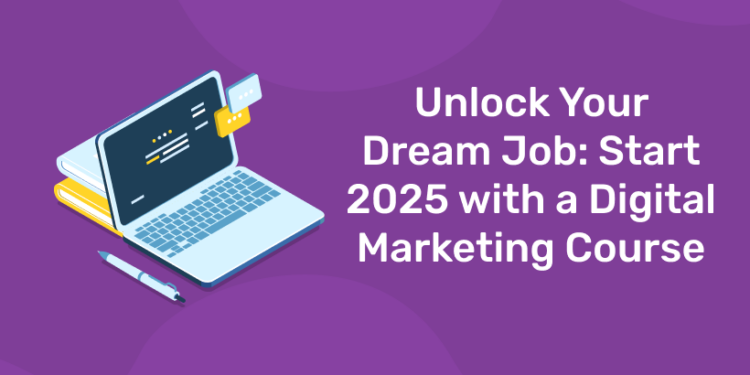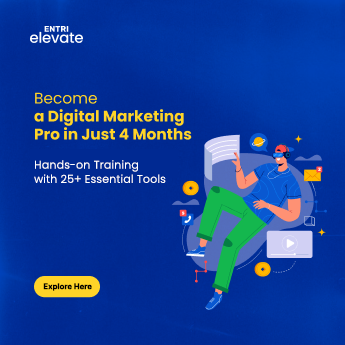Table of Contents
Once upon a time, in the early days of the internet, digital marketing was an elite skill for a niche group of professionals. Today, digital is so intertwined with marketing that it is almost impossible to separate them.
From search engines and social media to mobile apps and advertising, every organization now uses digital marketing in one way or another. This is exactly why it is so important to find a course that actually teaches you applicable skills.
Digital marketing skills are in high demand and are not only relevant to marketing roles. A digital marketing course can help you expand and update your skills, advance your career and feel more confident in your work. Consider a digital marketing course if:
- You’re exploring a career in digital marketing and want a structured and guided approach to learning essential skills and tools.
- You want to improve your marketing knowledge to stay relevant and competitive in your current role or industry.
- Are you an entrepreneur or small business owner and want to promote your business online more effectively?
- You need (or want) to master basic tools and strategies such as SEO, social media advertising, and email marketing.
Learn the fundamentals of digital marketing! Join the Classes today!
Why Learn Digital Marketing in 2025
The future of marketing is poised for a dramatic shift. Traditional strategies are cast aside and replaced by innovative, immersive experiences that require a complete rethinking of your strategy. With all the new trends, one thing is certain – mass media is disappearing and hyper-personalization will become the norm.
What’s Happening In The Present
Today’s consumers have high expectations – they demand authenticity, shared values and meaningful brand experiences that resonate on a personal level. At the same time, they are increasingly skeptical and overwhelmed by the endless promotion flooding their devices.
Traditional interruptive marketing tactics like TV commercials and billboards are losing their impact in this climate.
What Will The Future Of Digital Marketing Look Like?
The future of advertising is full of possibilities, but let’s try to predict it with the rapid streams of technological innovation and changing consumer behavior.
For example: We are seeing the rise of data-driven, automated and AI-optimized approaches. Hyper-targeted social media ads, emotionally intelligent chatbots and perfectly tailored recommendations. These approaches aim to deliver the right message at the right time on the right platform.
If there’s one overarching lesson I’ve learned in my career in finance, it’s that get-rich-quick business schemes are a fantasy. I’ve met many successful traders over the years—both while working at a hedge fund that managed billions of dollars in daily trades and after starting my own trading software company—and none of them claimed to have the secret to overnight wealth.
The truth is that trading is hard and often boring. It takes time, constant effort and patience. In my work, I follow many trends that are shaping the financial environment for independent traders. And while innovation drives our industry forward, some developments have the potential to throw investors off course. The following three trends are potentially dangerous for investors, but I believe we can correct them by implementing four sensible strategies.
Rise Of The Machines
Artificial intelligence (AI) has already begun to transform digital marketing and its influence is expected to become significant by 2025. AI-powered content creation, personalized customer experiences and data-driven decision making will become standard practices.
- AI-powered content creation: AI-powered content creation tools can help marketers save time and resources. With AI, they can also produce content that is more relevant and engaging to their target audience. The future of content marketing is bright with AI.
- Personalized customer experiences: AI can be used to recommend products or services to customers based on their past purchases and browsing behavior. It can create chatbots that can answer customer questions and provide support.
- Data-driven decision making: AI can be used to determine which marketing channels are most effective for reaching a specific target audience. It can also predict customer behavior, which can help marketers develop more effective marketing campaigns.
Rise of Immersive Technologies
Immersive technologies are having a significant impact on the way we live, work and learn. They will play an even bigger role in our lives in the coming years, especially in how we interact with businesses.
Here are just a few ways immersive technology is changing the way customers perceive things.
- Virtual shopping: Imagine trying on clothes in a virtual fitting room without leaving your home. Or use AR to see how the furniture would look in your living room before you buy it.
- Experiential Marketing: Attend product launches, concerts or sporting events from the comfort of your own home. Immerse yourself in the brand story and connect with it on a deeper level.
- Personalized Learning: Learn new skills or explore new worlds through immersive simulations. Get hands-on training without the risks or costs associated with traditional methods.
- Enhanced Customer Service: Get help from a customer service representative who sees what you see and guides you through troubleshooting steps in real time.
You Can Expect This in 2025
- Contextual ads: No more generic ads. Imagine browsing a travel site and seeing an ad for a cultural tour that perfectly matches your recent museum visit.
- Recommendations from influencers you trust: Your favorite fitness YouTuber shows off workout clothes that match their style, and you’ll naturally be hooked
- Sponsored content that educates and entertains: A cooking blog you love shares a delicious recipe sponsored by a brand with values like yours. It’s not just a sales pitch, it adds value to your cooking skills.
Digital marketing is a broad and dynamic field involving various strategies and techniques to promote products, services or brands using digital channels. Unlike traditional marketing, which relies heavily on offline methods, digital marketing uses the power of the Internet and electronic devices to reach a wider audience and engage potential customers.
Sign up to learn the basics of performance marketing in digital marketing!
How To Learn Digital Marketing in 2025
Digital marketing enables precise targeting based on factors such as demographics, interests, online behavior and location. This level of detail ensures that marketing efforts are focused on the most relevant and interesting audiences, increasing the chances of conversion.
3. Cost effectiveness
Compared to traditional marketing channels such as TV or print ads, digital marketing often offers more cost-effective options. For example, pay-per-click (PPC) advertising allows businesses to pay only when someone clicks on their ad, reducing unnecessary advertising spend.
4. Measurable results
Digital marketing campaigns can be tracked and measured extensively. Marketers can analyze data in real-time to understand the effectiveness of their strategies and make data-driven decisions for improvement. This level of analysis provides valuable insights into customer behavior and preferences.
5. Personalization and customization
Through digital marketing, businesses can deliver personalized messages and recommendations to individual users based on their interests and previous interactions. This personalized approach improves the customer experience and builds stronger relationships.
6. Availability 24/7
Unlike traditional brick-and-mortar stores with limited hours of operation, digital marketing allows businesses to be available to customers 24/7. Online platforms and automated tools facilitate continuous engagement, lead generation and sales.
7. Engagement and Interaction
Digital marketing supports two-way communication between businesses and their customers. Social media platforms and interactive content enable meaningful engagement, feedback and brand loyalty.
8. A level playing field
Digital marketing can benefit both small and large businesses. A well-executed digital strategy allows smaller companies to compete with larger corporations on a global scale without the need for significant financial resources.
9. Brand building and authority
A consistent and worthwhile digital marketing effort helps establish a brand’s authority and credibility in its industry. Content marketing, thought leadership and positive online interactions contribute to building a strong brand reputation.
10. Adaptability and flexibility
Digital marketing channels and strategies can be quickly adapted to respond to changing market trends, consumer preferences or business objectives. This agility enables businesses to remain relevant and competitive in dynamic environments.
11. Data-Based Decision Making
The amount of data available through digital marketing allows businesses to make informed decisions. A/B testing, user feedback and analytics allow marketers to refine their strategies and optimize campaigns for better results.
Achieve exceptional results with performance marketing techniques! Enroll Here!
Our selection of digital marketing courses has you covered, whether you’re a fresher looking to get into marketing, moving from a different domain or a seasoned marketer looking to expand your expertise.












